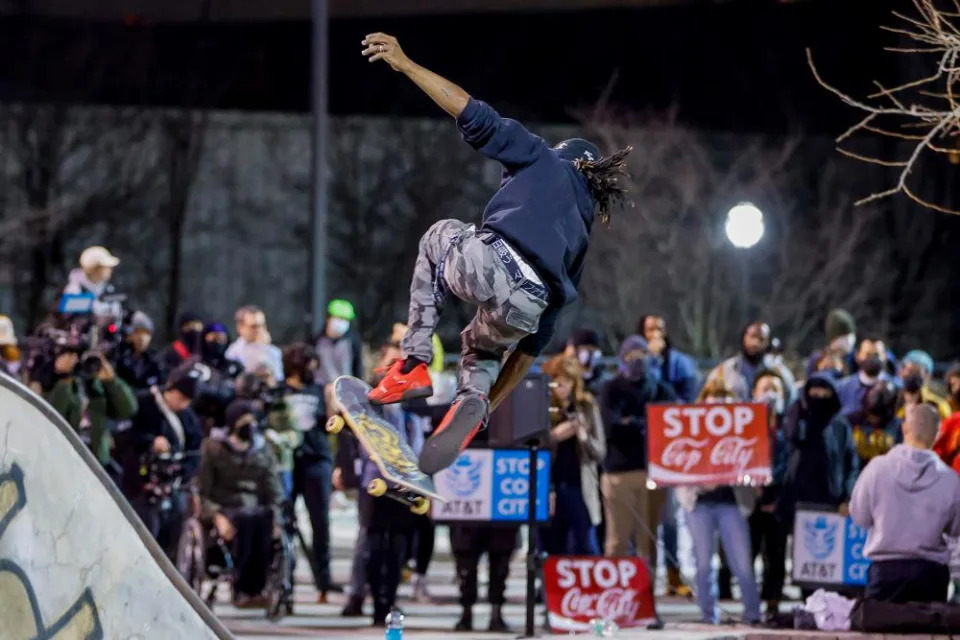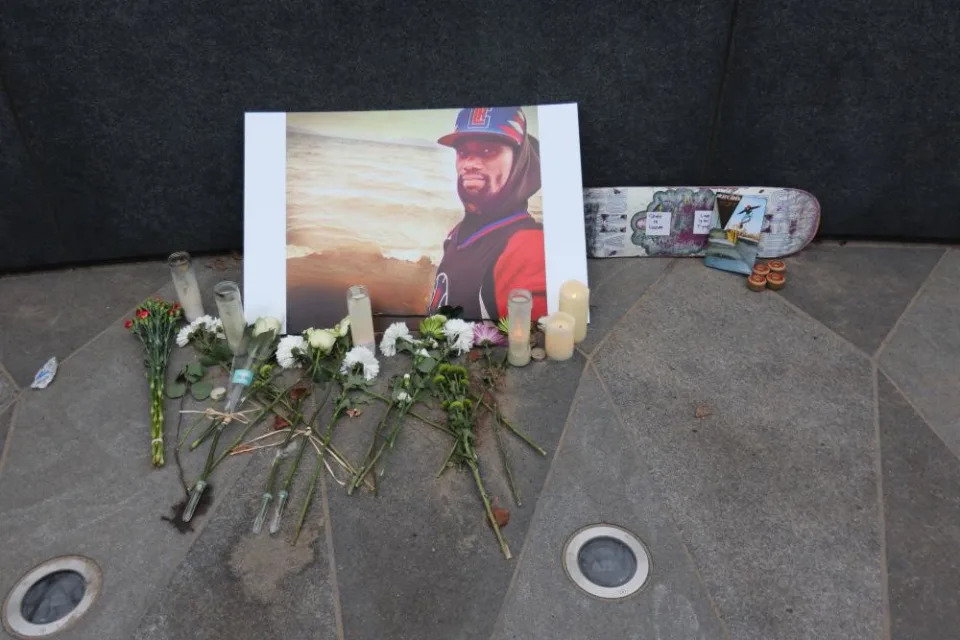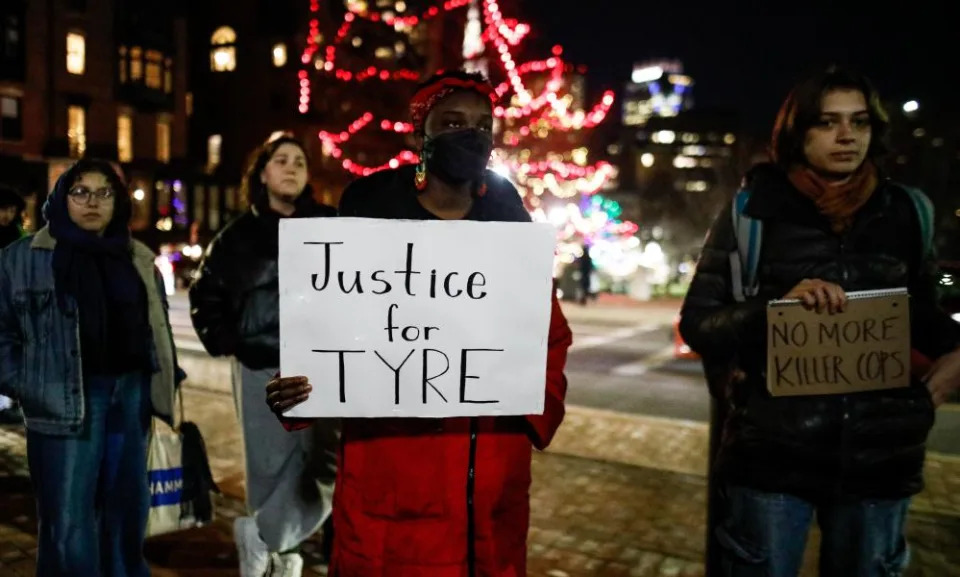Niloufar Haidari
Mon, 6 February 2023
It has been nearly a month since Tyre Nichols died after a beating by Memphis police. Even by the standards of a country with a long legacy of police violence, his death was breathtaking in its brutality – both in the severity of the beating by the police officers, and the negligence shown by the EMTs who stood around for 19 minutes while he fought for his life on the ground.
Nichols, 29, was a lot of things: a father, photographer, lover of sunsets and a skater. Due to its public image as a nuisance to polite society, skateboarding is a hobby intimately familiar with skirmishes with law enforcement; for Black skaters, who are often seen as outsiders in a world of outsiders, these interactions can be particularly fraught.

Dimitri Crippen rides his skateboard as a group of people protest over Tyre Nichols’ death at the Old Fourth Ward Skatepark in Atlanta last month. Photograph: Erik S Lesser/EPA
Since the news broke, the skateboarding community has come together to condemn the death and spread a joyful video of Tyre doing what he loved – skating. Celebrated Black skaters such as Stevie Williams have spoken out about the murder on social media, and this weekend saw skaters take to the streets from Memphis to Los Angeles to Keep Pushing for Tyre in remembrance.
‘I felt this deep, personal grief’: Patrick Kigongo
Acting executive board chair for the Harold Hunter Foundation and co-host of the Mostly Skateboarding podcast
That could have been me. It’s a recurring thought for any Black person in America when there’s a Black person killed by police officers, but this one really hit close to home. We often talk about the way that Black people are portrayed in media, and the clip that has been circulating of him skating has been refreshing because it’s something so joyous, this stark contrast to the footage of him being beaten by cops. When I saw that video I felt this deep, personal grief, something I didn’t anticipate.
Skateboarding is not a monolith, but something that every skateboarder has experienced is some sort of frightening or traumatizing experience dealing with either police officers or security guards. I remember the first time I got lined up with a bunch of my friends for skating at a loading dock behind a photo studio. There was something bizarre about it, in that we all knew what to do – you sit on your hands, you don’t say anything, nobody talks out of turn, and ideally, they let you go. I’ve had friends who have been slammed into police cars, friends who have been arrested and detained – I’ve certainly been handcuffed, I’ve been stopped and frisked.
I think there has been an increased political awareness in the wider skate community since the George Floyd protests, but certain scenes have always had a political bent. The difference now is that although the industry might still be mostly white, the ridership has diversified significantly. The skateboarder Na-Kel Smith went on Instagram Live around the time of the Floyd protests to talk about microaggressions and racism that he’s experienced in the van [on tour], and it awakened something – I really have to give credit to that conversation to get more people talking about race and identity within skateboarding.
A lot of skaters are putting together memorials for Tyre Nichols, digging into the fact that he was one of us. Skateboarders are very good at commemorating skaters’ lives, but that’s not enough, because it’s not going to bring Tyre back, and it’s not going to answer the fundamental question of what needs to be done. We showed up in 2020 in a lot of different ways, and the reaction, the pushback, was so big and so violent that it’s difficult to think about the idea of mobilizing in those numbers again. It feels as though we continue to expend so much energy, organizing, reacting, making posts, and we still can’t seem to create foundational changes to American federal or state laws that will protect Black people – and all Americans – from these kinds of violent or deadly encounters with the police.
‘The beauty of skateboarding is you become allies with anyone who’s on a skateboard’: Aaron Wiggs
Supreme NYC employee and community organizer
When I look at Tyre, I look at him as a Black man first and a skateboarder second. As a Black person in America, you grow to be a little numb – there’s the grief that you have for these victims, and also the not knowing if you’re going to be the next casualty while going about your day to day.
I’ve had run-ins with the cops and been in situations where I’ve been scared shitless – both on and off the skateboard. They will go to extremes to instill fear and let you know that they are the law. Even just driving while being Black – I’ve been pulled over for that, so you can imagine [what it’s like] when we’re skating and destroying property. There was a time we were skating a spot at a school and a cop came and called three cop cars, came walking out with hands on the gun – it’s so unnecessary, just tell us to leave.

A Tyre Nichols memorial at The Embrace sculpture on Boston Common.
Photograph: MediaPunch/Rex/Shutterstock

A skateboarder at the protest on behalf of Tyre Nichols in Atlanta.

A skateboarder at the protest on behalf of Tyre Nichols in Atlanta.
Photograph: Erik S Lesser/EPA
I’m originally from California. My family moved further inland because of the aftermath of the LA riots, and that’s how I got into skating – having white friends. They turned me on to it, but then you discover there are Black skateboarders. Back then there wasn’t a lot of us, and we stuck out like a sore thumb. I definitely experienced racism within the [skate] community that I was trying to be a part of, and the Black community at the time was so detached from it, they just viewed you as wanting to be white. You’re left in the middle questioning your identity: what is it about me doing something that I really want to do, and the way I express myself, that makes people treat me this way?
The beauty of skateboarding is you become allies with anyone who’s on a skateboard – you can go anywhere in the world and meet someone with a skateboard and you become friends. Your sense of community is stronger. As a skateboarder you’re already in the streets, so putting that energy out there in the form of protest during the BLM movement was something natural for skateboarders.
Going forward, I think the United States needs to be a lot more selective about who becomes a cop. If you understand the history of policing in the United States, it’s built from racism, from slave catchers who turned into the police force. It would be amazing if guns weren’t a thing, if police training was more tactical [so] they’re not trained to kill. This is something that my grandfather was petrified of when he was my age, and it still exists. It’s exhausting.
I’m originally from California. My family moved further inland because of the aftermath of the LA riots, and that’s how I got into skating – having white friends. They turned me on to it, but then you discover there are Black skateboarders. Back then there wasn’t a lot of us, and we stuck out like a sore thumb. I definitely experienced racism within the [skate] community that I was trying to be a part of, and the Black community at the time was so detached from it, they just viewed you as wanting to be white. You’re left in the middle questioning your identity: what is it about me doing something that I really want to do, and the way I express myself, that makes people treat me this way?
The beauty of skateboarding is you become allies with anyone who’s on a skateboard – you can go anywhere in the world and meet someone with a skateboard and you become friends. Your sense of community is stronger. As a skateboarder you’re already in the streets, so putting that energy out there in the form of protest during the BLM movement was something natural for skateboarders.
Going forward, I think the United States needs to be a lot more selective about who becomes a cop. If you understand the history of policing in the United States, it’s built from racism, from slave catchers who turned into the police force. It would be amazing if guns weren’t a thing, if police training was more tactical [so] they’re not trained to kill. This is something that my grandfather was petrified of when he was my age, and it still exists. It’s exhausting.
‘If you’re an adult Black skateboarder, you are seen as a problem’: Josh AdamsMemphis skater and activist with Decarcerate Memphis and the Official BLM Memphis Chapter
As a Memphis skateboarder, the anger is that I could have met Tyre Nichols through skating, but that’s not a possibility now. As an activist, it angered me because on December 6, Decarcerate Memphis presented data to the city council about the dangers of these traffic stops. The police here have used messaging that couples reckless driving with violent crime – in [Tennessee], there are a lot of traffic maneuvers that can be deemed “reckless driving”, even just running a stop sign. Once you’ve linked these two things together, the police now have probable cause, and you’ve created a perfect situation for police to treat people with utter disregard for their life over a simple traffic stop, which was what led to Tyre Nichols’s death.
Black people deal with inequities around policing no matter what they’re doing and where they are. When I was younger, the police might see me skateboarding and say things like, “Oh, well, at least you’re not doing anything bad like the other [Black] kids are doing.” But as I got older, they see me and immediately jump to the assumption of drug use. If you’re an adult Black skateboarder – especially if you have facial hair and tattoos – you are seen as a problem. I was pulled over in 2013 and the officer saw a skateboard in the back of the car and said, “It seems like you’re on your way to the skate park,” which he [seemed to] associate with drug possession, and asked us to step out of the car, patted us down, asked if he could search the car, and then tried to call for a canine unit when I refused.
The whitewashing of skateboarding by the mainstream media leads to a false ostracization that happens when you start skateboarding – people think that you’re not into Black culture, or that you might not be from a certain type of background. Most of the skaters I skate with are Black people from a working-class background who have been through the justice system. The only thing people know about skateboarding here is major competitions like the X Games, so we don’t see skaters like Antwuan Dixon, Terry Kennedy, Tyshawn Jones – he’s won skater of the year twice, but a lot of people don’t even know his name.
One thing that I hope we do is begin to reduce police funding – we don’t need armed patrolmen to help us have safe traffic. The police need to be defunded, social programs need to be invested in, and we need to pass policy to make sure that the police are held accountable for any criminal activity they engage in.
Yes, Black officers killed Tyre Nichols. What is the correct response to that?
Reverend William Barber and Jonathan Wilson-Hartgrove
Tue, 7 February 2023

Photograph: Xinhua/Rex/Shutterstock
On Wednesday 1 February, family and friends of Tyre Nichols, along with Vice-President Kamala Harris and other representatives from the White House, gathered at the Mississippi Boulevard Christian church in Memphis, Tennessee to grieve the brutal murder of a young Black man. Such public grief on the first day of Black History Month echoes the moans of millions of Black Americans who have mourned the incomprehensible violence of the Middle Passage and auction blocks, slave patrols and lynch mobs, Klan assaults and police beatings. God only knows the name of every person who has been brutalized by the racial caste system that America’s plantation economy created.
But in this moment we must mourn and cry another pain. The men who killed Tyre Nichols were Black, as he was. This is not a case of individual racists, but another example of a policing system rabid with brutality and death. This kind of death is not new, and a true remembering of Black history must address this too. This most recent atrocity that the world witnessed in the video from Memphis is a symptom of a deeper social sickness that must be confronted before we as a nation can be whole.
To remember Black history is to also recall how Black overseers were recruited to maintain order on America’s plantations. When an enslaved person defied the slaveholder’s orders, it was often another Black person who was tasked with strapping the defiant bondsman to a whipping post and brutalizing him in front of other enslaved people. During the civil rights movements, Black and white activists reported terrible beatings in southern jails at the hands of Black men – sometimes fellow inmates – who did the bidding of local sheriffs. The hierarchy of racial terror has never been only enforced by white people. Nor has it only harmed Black people.
From Black and white abolitionists to Black, white, brown and Native civil rights workers, anyone who has directly challenged America’s racial hierarchy has been subject to brutality. But moral fusion movements have also been clear that our goal is to transform systems that devalue the lives of all poor and marginalized people.
Over the past decade, the Black Lives Matter movement has done important work to raise consciousness about the way that non-white people disproportionately suffer from police brutality. But this brutality can also be directed at white people. Just last year a white officer in Concord, North Carolina, shot and killed a poor white man, then lied about what had happened until the body-camera footage of the incident was released. When law enforcement is tasked with defending an order in which inequality is normal, brutality is what poor people come to expect from their interactions with the law.
This is why moral fusion movements that have challenged America’s system of racial hierarchy have never been made up of Black people only. It is also why these movements have not directed their challenge solely at the enforcers of an unjust system.
To focus only on “police reform” in our present crisis would be akin to working for an end of the whipping post during slavery. Abolitionists did not simply demand better treatment of enslaved people. They insisted that slavery was wrong. Likewise, the civil rights movement did not simply protest the brutal enforcement of Jim Crow segregation. They insisted that segregation was wrong because it dehumanized Black people and propped up an economic system in which poor white people were offered the “psychological wages” of whiteness while they continued to struggle to feed their families.
The public lynching of Tyre Nichols is a harsh reminder that we live in an America where some people’s lives are considered expendable. The officers who murdered this man did not act alone. Who else killed Tyre? Every politician who has been silent of the issues of violent public policy that denies some Americans basic human rights like housing, healthcare and a living wage. Also, every preacher and moral leader who remains quiet and doesn’t challenge the value gap in our society until another fatality is caught on camera. Who else bears responsibility for this brutality? Every American who has refused to believe on-the-ground activists who are crying for justice, and every politician who forfeited the chance to say: “No others bills in Congress until we have police reform, voting rights, living wages and universal healthcare.”
Yes, the officers who brutalized Tyre must be held accountable for their actions. Far too often, officers who abuse their power and the public trust face no consequences in cases like these. But we must also acknowledge that their brutality is a byproduct of too many Americans passing the buck and abdicating responsibility for a society where 700 people die every day, not because God has called them home but simply because they are poor.
Fifty-five years ago, Dr King went to Memphis because two Black garbage workers had been killed on the job by faulty equipment. He wasn’t there simply because the workers were Black, nor was he there only to demand repair of the equipment that had killed them. King, who was in the midst of organizing the Poor People’s Campaign, was in Memphis because working people were standing together to demand dignity under the slogan “I Am A Man”. Until Black, white, Native and brown people unite to insist that our present economic reality is wrong and can be changed by policies that lift from the bottom so everyone rises, we cannot truly say that we have learned the lessons of our history or honored the life of one more soul who has died at the hands of law enforcement.
The Rev William Barber is president of Repairers of the Breach and founding director of the Center for Public Theology and Public Policy at Yale University
Jonathan Wilson-Hartgrove is assistant director of the Center for Public Theology and Public Policy at Yale University
No comments:
Post a Comment